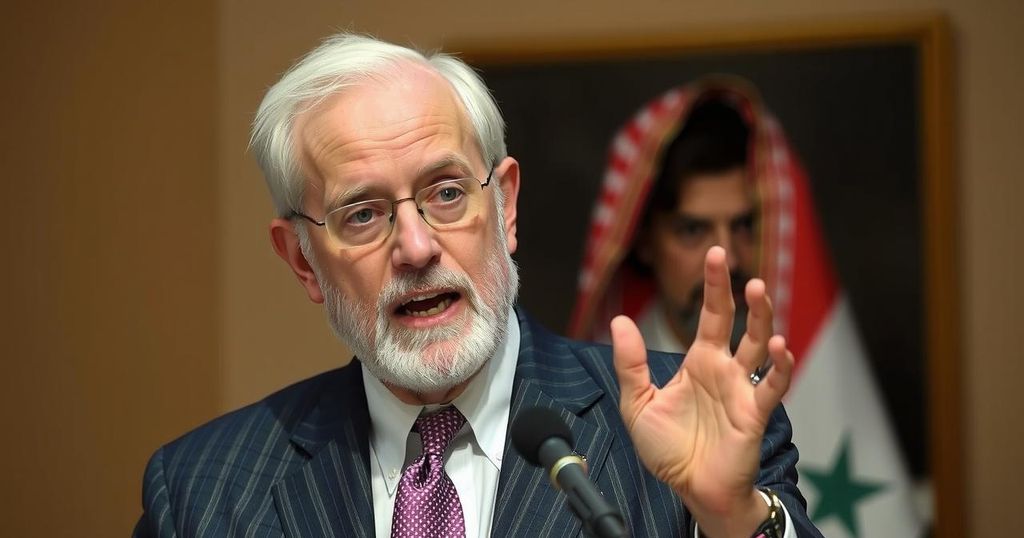Biden Calls Assad’s Fall a ‘Fundamental Act of Justice’ Amid Risks in the Middle East
President Biden characterized the fall of Bashar Assad as a ‘fundamental act of justice,’ acknowledging the risks involved in the resulting uncertainty for the Middle East. He emphasized the collapse signifies a shift in power dynamics, while President-elect Trump expressed skepticism about U.S. military involvement. The current U.S. military presence in Syria remains focused on preventing a resurgence of ISIS amid the ongoing complexities of the region’s conflicts.
President Joe Biden has commented on the recent fall of Syrian President Bashar Assad’s regime, deeming the event as a “fundamental act of justice” after decades of oppression. However, he also warned of the “risk and uncertainty” that this transition presents for the Middle East, highlighting the delicate geopolitical landscape. Biden stated that the United States has been monitoring reports indicating Assad’s possible refuge in Moscow following the collapse of his government.
Acknowledging the impact of coordinated efforts by the U.S. and its allies, Biden noted that the traditional backers of Assad, namely Russia, Iran, and Hezbollah, can no longer sustain his rule. This shift has reconfigured the power dynamics in the region, a point he underscored as crucial at this precarious juncture.
In contrast, President-elect Donald Trump remarked that Assad had abandoned his position due to the perceived lack of support from Russian President Vladimir Putin. Trump’s assertive stance against U.S. military intervention in Syria is emphasized by his proclamation on social media stating, “THIS IS NOT OUR FIGHT.” This reflects an emerging divergence in foreign policy perspectives between the current administration and the incoming one.
The current U.S. military presence in Syria is primarily focused on preventing a resurgence of the Islamic State group, with about 900 troops deployed, primarily collaborating with Kurdish allies in the northeastern part of the country. Amidst the turmoil in Syria, significant concerns remain regarding the potential escalation of conflicts throughout the broader Middle Eastern landscape.
Furthermore, the Biden administration has categorized the leading Syrian opposition group that played a vital role in dethroning Assad, Hayat Tahrir al-Sham, as a terrorist organization, revealing the complex web of affiliations complicating the situation. The voices of displaced families, including that of missing journalist Austin Tice, continue to resonate, urging for their loved ones’ safe return as the civil war’s consequences remain far-reaching.
By restoring stability and justice to Syria, Biden envisions alleviating some tensions associated with Russia’s ongoing war in Ukraine. Yet, the call for caution persists as international stakeholders assess the aftermath of this unexpected regime change and its implications for future diplomatic relations throughout the region.
The Syrian civil war has entered a new phase with the recent downfall of Bashar Assad, a longstanding figurehead whose regime has been associated with extreme oppression and human rights violations. Since the onset of the conflict over a decade ago, numerous actors, including local insurgent groups and foreign allies, have influenced the trajectory of the war. The geopolitical landscape remains volatile, intertwining with other regional conflicts, especially in light of ongoing tensions involving Israel and various militant groups. As Biden’s administration approaches this change, the balance of power is shifting, affecting the entire Middle East dynamic.
In conclusion, President Biden’s remarks on Assad’s fall indicate a significant shift in Syria’s political landscape, although it introduces a complex array of uncertainties and potential conflicts in the region. As the Biden administration navigates this transitional phase with cautious optimism, the divergent views of the incoming Trump administration add layers of complexity to U.S. foreign policy. While the focus remains on combating ISIS, the implications of Assad’s absence on broader Middle Eastern stability will continue to demand careful consideration from all stakeholders involved.
Original Source: apnews.com




Post Comment